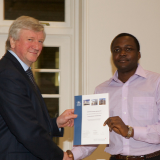The Road to Character (2015) Book Summary and Insights
Book Title: The Road to Character
Subtitle: None
Publication Date: 2015
Author Name: David Brooks
Book Summary
This book is on the lack of attention placed on moral development in recent culture. There is an advocacy for a shift from the narcissism of ‘me’ and seeking status and climbing up social ladders to the direction of humility and virtue. The author argues that challenges and suffering can offer us more opportunities for growth than constant success and promotion. The author uses biographical examples to portray his criticism and inherently make emphasis on development of character. To find out more, please read the following insights.
Who Is This Book For?
This book is for parents, philosophers, Christians. It is for those who want to understand and pursue moral development. Those seeking to cultivate character.
About The Author
David Brooks is one of the nation’s leading writers and commentators. He is an op-ed columnist for The New York Times and appears regularly on PBS NewsHour and Meet the Press. He is the bestselling author of The Social Animal: The Hidden Sources of Love, Character, and Achievement; Bobos in Paradise: The New Upper Class and How They Got There; and On Paradise Drive: How We Live Now (And Always Have) in the Future Tense.
Buy Book: Support The Book Author And Our Work
Great books should be read, studied, and reviewed frequently, so reading the actual book may provide more value to you than the book insights on this page. Besides, this would support the work of the book author and what we do on LarnEdu. What could be better?
Important Notes
We get a small compensation from Amazon when you visit your nearest/local Amazon site via our affiliate link to purchase an item within 24 hours or if you add it to your cart and checkout within 90 days. This is no additional cost to you and supports our work.
The information on this page is meant to supplement the actual book(it is not a book review but distils the key insights or ideas from the book in under 5000 words). The content creator or LarnEdu does not necessarily support the views, thoughts, and opinions expressed in the text/book. Reasonable skepticism should be applied with any views, thoughts or opinions expressed/shared by the book author or content creator.
Reading the contents of this page does not guarantee specific results. The best lessons are achieved from taking consistent action in the real world rather than being addicted to the illusion of progress by getting stuck on reading an infinite amount of books or book summaries and insights. LarnEdu and the content creator accepts no responsibility or liability for the accuracy of the information on this page or how it is used.
Book Insights

A Change in Societal Values
The author contends that there is a divide in human natures. He represented the two opposing sides as Adam I and Adam II. The Adam I being the external career-oriented, ambitious side of our nature. He wants to win victories and conquer the world. He is creative and lives by a straightforward utilitarian logic. The Adam II, however, is internal and embodies certain moral qualities. He aims to serve and lives by an inverse logic. This logic is a moral logic and not economic as that of the Adam I. The humility of Adam II is clear in his willingness to suppress his need and desire for himself for the sake of the community at large. As contradictory as both natures are, people lean towards one or the other depending on the prevailing societal culture in play during that period. There has been a shift over the past years from the culture of humility to that of self-centeredness. The society we live in nurtures the Adam I and neglects Adam II. The society encourages us to pursue how to have a great career and to leave out our inner lives. The era where people put emphasis on moral qualities like humility and did not brag about their affiliations has long gone. The author made an illustration with George Bush Sr. who was part of the era of Adam II; he stated that even as he was running for president; he resisted speaking about himself. He instinctively avoided self-promotion and crossed out the word ‘I’ in his campaign speeches. Now, however, people are more involved in their own desires. The society encourages someone to see himself or herself as the center of the universe.
The Shift from Humility to Individual Desires
The author posits that the society has experienced a cultural shift which has substituted humility for pride. The shift from the culture of self-effacement which states that no one is better than the other, to the culture of self-promoting of one’s success. He furthered illustrated that there was an emphasis placed by society that humans lacked strength and were essentially weak. This gave rise to the growth of Adam II nature in humans. The instance made by the author of the Christian thinker Augustine who did away with his pride, desire for fame and status and instead made teachings on sin, necessity of grace and human weakness. During this time, humanists like Samuel Johnson, Michel de Montaigne, and George Eliot laid emphasis on the limit to the knowledge and understanding of ourselves. They also viewed pride with suspicion and emphasized the limitations in our individual natures. The era of moral romanticism and inner goodness also came. The shift however happened after the Depression and the war when people set out to let loose, relax and to enjoy. At that period, people sought to escape the shackles of self-restraint and depravity and live a more positive and upbeat life. The shift went from the culture of noble restraint to self-indulgent decadence. This change put more emphasis on pride and self-esteem. It seemed to have a positive effect; it encouraged oppressed members, women and the minorities to raise their sights and aspirations. The author made an example of the teachings made to women at the time to lead lives committed to subservience and service that led to self-abnegation. The shift helped them embrace the idea of self-expression. This shift might seem like a positive impact, but it has however cost the society a lot, even in terms of lesser empathy and morality.
Societal Disconnection from Joy and Satisfaction
The self-promoting and individualistic cultural shift has truly affected the society and individual lives. The author talks about how this shift has affected the society. The current dominating Adam I nature encourages one to go for one’s desires, to assert and advertise oneself and to display one’s achievements. However, in doing so one becomes less in touch with his or her morals. This new culture has positioned our lives around how to do things that will propel you to success. It does not encourage you to ask yourself why you are doing the things. It has driven people to seek approval and to measure their lives through the praise of other people. In encouraging people to make the most out of their capacities, it has led to a decrease in the moral virtues vital in figuring out how to live life in a meaningful order. The effect of the new change to Adam I has sometimes affected the ways of parenthood. In raising children of today, parents adopt the approach of training through praise and honing to an unprecedented degree. These current trends adopted by the parents are no longer a show of simple affection. It is rather affection coated with the parents desires for the children to achieve worldly success. Parents spend their time grooming their children, investing in their skills and telling them they are special merely as a means for self-promoting. The author mentions studies conducted. The annual nationwide survey on college freshmen to gauge their values and what they want in life. This survey conducted by researchers from the University of California, Los Angeles showed that in the past 80 percent of freshmen had a strong motivation to develop a meaningful philosophy of life. However, the survey as of recent the percentage has decreased to half. The survey that showed in 1966 that 42 percent freshmen important life goal was to become rich and the number increases to 74 percent by 1990. Some parents unconsciously shape their love and affection to steer their children towards the path or the behavior they feel is the best to lead to achievement. This affects the children’s capacities to make certain decisions about their lives. The pressure of this change to Adam I invariably affect the society and causes a disconnect from the moral logic of Adam II.
Understanding Human Flaws
Self-centeredness drives a society further away from moral virtues. To change this is to understand and embrace the flaws inherent in us. When one struggles with weaknesses, he or she realizes that he or she is undeserving of the love and affection given by others. This eventually leads to the person showing gratitude for receiving such love and affection shown by others. This will have an effect in making the person acutely aware of his or her flaws. In recognizing these flaws one should reach out to others and try to correct moral errors. This recognition and earnest admission of these flaws can help overcome self-centeredness. The author made an illustration with Dorothy Day and how she struggled with depression and alcoholism. He stated that it was in admitting her flaws of depression and alcoholism that she was able to get her life back in order by shifting her focus on to others rather than herself. She was able to admit to her flaws and put her life back on track by starting up a newspaper with an aim to aid those who were suffering through the Great Depression and to use the social values and teachings of the Catholic Church to create an easier society for people to be good. This project moved her focus on to others and in doing work for others she gained a certain steadiness that she earlier lacked. In her published work, The Long Loneliness she described her life as a sad and restless and how she needed and made a deep and total commitment to something holy and that led to her life of service to the community. The memoir was an affirmation that we humans all have the same problem we constantly struggle with. The problem of selfishness and which we need to curb and avert our lives and focus back to morality. In following Dorothy Day’s example, we should be able to share our struggles and admit our individual flaws. When we share with each other, we eventually learn ways on which to curb and overcome our flaws just like Day and by doing so we make way for the Adam II.
Freedom from Pride
In building character, one needs to cope with certain internal struggles. The support of external bodies like family, friends, mentors, or God could be all the support one needs in overcoming struggles. The author made an example with the story of George Eliot, a pseudonym used by the writer Mary Anne Evans. She was a self-absorbed and desperate and seriously craved for love and attention. These were some of her internal struggles. However, this all changed when she met her partner George Lewes who supported her and provided her with the love and security that she needed. Before she met George Lewes, Mary Anne Evans was lonely although intellectually mature. The love of her partner Lewes helped to build her confidence in her writing and to help her with her insecurities. We all need external help in our struggles, even though reaching out can prove difficult because of our pride. Pride makes one appear self-sufficient and egotistical. It makes room for competition. It involves making your achievements the center of your happiness and using your success to measure your worth. It is a major hindrance towards the road to character building. To truly get on the road to building character, you must get rid of your pride and be receptive of others and their offer to help. In admitting our flaws and then accepting the help offered by other people we then balance both Adam I and Adam II natures and by so doing gain joy, happiness and fulfillment.
Key Quotes
Here are some key quotes from the book:
“Humility is the awareness that there’s a lot you don’t know and that a lot of what you think you know is distorted or wrong.” – David Brooks, The Road to Character.
“Start your work from where you live, with the small concrete needs right around you. Help ease tension in your workplace. Help feed the person right in front of you. Personalism holds that we each have a deep personal obligation to live simply, to look after the needs of our brothers and sisters, and to share in the happiness and misery they are suffering.” – David Brooks, The Road to Character.
“Moral improvement occurs most reliably when the heart is warmed, when we come into contact with people we admire and love and we consciously and unconsciously bend our lives to mimic theirs.” – David Brooks, The Road to Character.
Conclusion
Getting rid of pride and showing humility is a very crucial part of moral development. When you seek help, some may consider that as an act of weakness. However, we show true strength in identifying our imitations and asking for help and by so doing eventually helping one another.
Since You’re Here …
Great books should be read, studied, and reviewed frequently, so reading the actual book may provide more value to you than the book insights on this page. Besides, this would support the work of the book author and what we do on LarnEdu.
You can also support the work we do at LarnEdu work by making a one/off or monthly donation(via PayPal) for as little as £0.99 or sharing this content.
Do you have any feedback or suggestions? Use the comment section below or send us a message.















